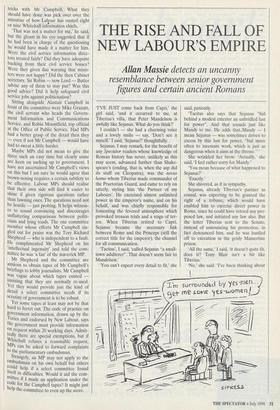WHAT I WOULD HAVE ASKED ME
Sue Cameron meets Alastair Campbell,
and discovers that he would have been tougher on himself thin MPs were
ALASTAIR CAMPBELL was clearly rel- ishing his triumph over the Commons Pub- lic Administration Select Committee when I bumped into him at a party the following night. It occurred to me that he would have made an infinitely better job of cross- examining the Prime Minister's official spokesman — i.e. himself — than did those backbench MPs. At times it had been like watching men trying to carve custard.
So I asked what he would have done had he been one of the inquisitors. He told MPs he never assumed he was off the record, so I am sure he will not mind me passing on what he told me. MPs badly need some tips from a professional. The word at Westminster is that select commit- tees are making an impact when it comes to holding the Blair government to account and some are even demanding more cash and better support. But they will never sustain the momentum unless as Mr Campbell would put it — they raise their game. Whether they can hope to match his mastery of language is another matter. 'What would I have asked myself?' he mused. Almost immediately he found the answer. 'I would have asked me if I ever said "f—" when giving briefings. I'd have had to say yes. And then I'd have asked me if that kind of language. . . . '
He did not need to say more. To make such a stratagem work, MPs would have to develop that presence and authority that Mr Campbell displayed in abundance when he appeared before them. It is easy to imagine such ammunition in the hands of a consummate performer — someone who would ask in arctic tones whether Mr Campbell believed that four-letter words were appropriate for No. 10's official spokesman or whether such language was demeaning to the high office of the Prime Minister. Mr Campbell at his sternest could surely have made the Prime Minis- ter's official spokesman blush.
The Public Administration Committee would not even have had to ask about the f-word — though that would have been a nice touch. As it happened the actual hear- ing included enough references to 'balls' and 'C-R-A-P' to fuel any number of ques- tions about the language of politics becom- ing the language of the gutter. Having found a potential weakness, Mr Campbell assured me he would never have let him- self off the hook the way some of those MPs did.
The committee is inquiring into the Government Information and Communi- cations Service. Mr Campbell, an overt Labour supporter, holds a civil service post and MPs are interested in whether he breaches Whitehall rules on impartiality.
The Prime Minister has said publicly that one reason Mr Campbell comes in for criticism is that he is so good at seeing off the Tories — something that would tradi- tionally be unacceptable behaviour in a civil servant. Members of the Public Administration Committee duly raised the matter but then failed to pursue it. Instead, they allowed the audacious Mr Campbell to describe in detail those criti- cisms of the Tories it would not be proper for him to make.
Facts provide the strongest weapon for select committees trying to scrutinise gov- ernment effectively. MPs missed several tricks with Mr Campbell. What they should have done was pick over over the minutiae of how Labour has ousted eight or nine Whitehall information chiefs.
`That was not a matter for me,' he said, but the gleam in his eye suggested that if he had been in charge of the questioning he would have made it a matter for him. Were the civil service information direc- tors treated fairly? Did they have adequate backing from their civil service bosses? Were they given due warning that minis- ters were not happy? Did the then Cabinet secretary, Sir Robin — now Lord — Butler advise any of them to stay put? Was this good advice? Did it help safeguard civil service jobs against politicisation?
Sitting alongside Alastair Campbell in front of the committee were Mike Granatt, the civil servant who heads the Govern- ment Information and Communications Service, and Robin Mountfield, top official at the Office of Public Service. Had MPs had a better grasp of the detail then they — even if not Mr Campbell — would have had to sweat a little harder.
Maybe MPs did not mean to give the three such an easy time but clearly some are keen on sucking up to government. I have not ascertained Mr Campbell's views on this but I am sure he would agree that brown-nosing requires a certain subtlety to be effective. Labour MPs should realise that their own side will find it easier to shine if given rigorous questions rather than fawning ones. The questions need not be hostile — just probing. It helps witness- es to sound convincing and discourages unflattering comparisons between politi- cians and lying toads. The one committee member whose efforts Mr Campbell sin- gled out for praise was the Tory Richard Shepherd — who is independent to a fault. He complimented Mr Shepherd on his `intellectual ingenuity' and told the com- mittee he was 'a fan' of the maverick MP.
Mr Shepherd and the committee are anxious to obtain tapes of Mr Campbell's briefings to lobby journalists. Mr Campbell was vague about which tapes existed insisting that they are normally re-used. Yet they would provide just the kind of detail a select committee needs if its scrutiny of government is to be robust. Yet some tapes at least may not be that hard to ferret out. The code of practice on government information, drawn up by the Tories and endorsed by New Labour, says the government must provide information on request within 20 working days. Admit- tedly there are special exemptions, but if Whitehall refuses a reasonable request, MPs can be asked to forward complaints to the parliamentary ombudsman. Strangely, an MP may not apply to the Ombudsman on his own behalf but others could help if a select committee found itself in difficulties. Would it aid the com- mittee if I made an application under the code for the Campbell tapes? It might just help the committee to even up the score.















































































































 Previous page
Previous page